By The Herald Editorial Board
We don’t remember any of this from “I’m Just a Bill,” the 1976 Schoolhouse Rock cartoon that followed a gravel-voiced singing piece of legislation from bill to law.
With Republicans in the U.S. House ready to vote on their version of tax reform legislation this week, Senate Republicans are preparing their tax cuts proposal for a committee vote. The legislation in both chambers is largely meant to slash the corporate tax rate from 35 percent down to 20 percent. The process is being hurried along so Congress can get the tax bill to the president’s desk before Christmas and give the Republicans at least one major piece of legislation signed into law before the end of the year.
But not content with a major rewrite of the U.S. tax code, Senate Republicans now are trying to make up for their failure to adopt a repeal of the Affordable Care Act, aka Obamacare, by shoehorning in a provision to the tax legislation that would end the ACA’s mandate that all Americans have health care coverage.
Along with further sabotaging the ACA — a sweetener for conservative members of Congress — this also would gain an estimated $330 billion in savings over the next decade, helping Republicans keep the cost of the tax cuts under $1.5 trillion over the next 10 years. As explained in Sunday’s editorial on the House version of the tax cut package, that limit — which is what passes for fiscal conservatism now — was adopted to allow House and Senate to pass tax reform with a simple majority, avoiding the need for any buy-in from Democrats.
As with the ACA repeal’s demise in July, three GOP senators may stand in the way of the mandate repeal and, if it’s connected to it, the tax package: Sens. Susan Collins of Maine, Lisa Murkowski of Alaska and John McCain of Arizona. The trio range from skeptical to noncommittal. A fourth Republican, Sen. Ron Johnson of Wisconsin has come out against the tax bill’s small business provisions. The bill can lose the support of only two Senate Republicans and still pass.
But Senate Republican leaders are offering a previously negotiated bipartisan bill as an enticement for the support of those senators and others.
As the ACA repeal lumbered toward failure this summer, Sen. Patty Murray, D-Washington, and Sen. Lamar Alexander, R- Tennessee, worked collaboratively on legislation to stabilize the insurance markets. That legislation, which has the support of at least 60 members of the Senate, is ready for a vote, but Democrats now are objecting to its use to ram through the tax bill and the insurance mandate.
While the tax reform bill and the ACA repeal need only a simple majority in the Senate for passage, the Alexander-Murray bill has to clear a 60-vote threshold, meaning at least eight Democrats would need to sign on. The Washington Post reported Wednesday that Minority Leader Chuck Schumer, D-New York, said Democrats won’t support the legislation if it’s used to advance the tax package.
Murray, through a spokesman on Wednesday, didn’t go that far, but doesn’t want to see the bill she fought for used to advance the tax bill or weaken the ACA. In a press release the same day, Murray said the move was counter to the bipartisan effort she and Sen. Alexander led.
“Tacking Alexander-Murray onto the partisan Republican tax reform effort is like trying to put out a fire with penicillin. It will not do anything to help,” Murray said in a press release and in comments to the Senate health committee.
The bill was meant to address needed reforms to the ACA, and not cure the deprivation that would be caused by ending the insurance mandate, her spokesman said.
The $330 billion in savings from the mandate repeal would come from the federal government not having to subsidize as many policies through Obamacare, but it would also mean an estimated 13 million fewer Americans with coverage. Without the mandate, the Congressional Budget Office estimates that insurance premiums for many would increase by about 10 percent and not just for those with coverage through the ACA.
“What Senate Republicans are proposing now is the exact opposite and the wrong direction for families’ health and financial security,” Murray said.
And if last week’s elections are an indication, it’s not the direction many Americans want to see taken on health care or taxes. In the Nov. 7 Virginia gubernatorial race, won by the Democratic candidate by 9 points, 77 percent of voters said health care was their top issue. Voters in Maine passed a ballot measure to expand Medicaid in that state. Regarding Republican tax plans, a new Quinnipiac University poll found that only 25 percent of those polled approved, while 52 percent oppose the GOP proposals.
For the reasons outlined in Sunday’s editorial, the Republicans’ tax reform proposals, at the least, need more discussion and a bipartisan process. Even the limited review that Republicans have allowed in their rush for passage now shows that some 14 million families across the country, including 300,000 middle-class families in Washington state, according to Sen. Maria Cantwell, D-Washington, would see a tax increase rather than the tax cuts Republicans have promised.
If Republicans can’t pass a tax reform bill — an issue that was supposed to be in their wheelhouse — without having to offer incentives to conservative members of Congress who are keen to kill the ACA, then the divisions within the Republican Party are deeper than we thought.
Talk to us
> Give us your news tips.
> Send us a letter to the editor.
> More Herald contact information.

























